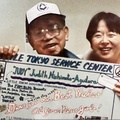The sounds of the explosions seemed to get louder every day. Kintaro felt his whole body shake as the booms seemed close to shattering his ear drums.
His roommate, Makoto, had disappeared in the night. There was no one to retrieve him from his dark thoughts. He was afraid to sleep because he didn’t want to be caught off-guard. That’s what happened in the Boshin War. He had closed his eyes for a few minutes and then—BAM! A projectile tore through the castle walls and killed his sister and his mother.
Who had been responsible for such bloodshed and fatalities? There was no Meiji Emperor in California. But there was another person who had helped with the resistance but failed. John Henry Schnell.
When Kintaro first agreed to come with him to Gold Hill, he trusted the man. He was a gaijin, but he had a Japanese wife and a baby at the time. He had a vision for Wakamatsu Colony, how they would all grow rich with a bounty of silk and tea leaves. But Kintaro and the others soon discovered it had been all talk. The eucalyptus and tea plants had all wilted. There was nothing for them here.
Someone had to be blamed for all the suffering. The gaijin who had tricked them into coming here. First the voices of his deceased relatives would visit Kintaro often. However, now, perhaps with the distance over the Pacific Ocean, their voices had become weak. That was Schnell’s doing as well. Kintaro was convinced of it.
When Kintaro went through the drawers in their small cottage, he discovered that the knives for food and small repairs were all gone. He suspected that Makoto had something to do with that. He was always telling Kintaro that he should speak to a doctor about his nightmares and bursts of anger.
How could he defend himself against the evil one? Kintaro wandered into the other abandoned homes, but they were all emptied out. He approached the cottage that Matsunosuke “Mats” Sakurai and the carpenter, Kuninosuke “Kuni” Masumizu, shared.
Mats was still up and seated outside on the stairs leading up to his house. He was cleaning his work boots of clumps of dirt. Mats was meticulous that way. He observed people and objects carefully; sometimes Kintaro felt that the older man could see right through him.
“Oi, Kintaro. You are up late,” Mats called out.
“Yah, yah.” Kintaro was annoyed. Mats was a calming influence and he didn’t want to be calmed. Kintaro walked away from Mats and hid behind the Schnell house. The family had several knives. Mats had seen the wife, Jou, and their nanny, Okei, use them when they cooked. With the emptying-out of the colony, Okei was now sleeping in the servant’s quarters in the main house.
The sky was quite dark, the moon the shape of a scythe. Kintaro slashed the air with his hands. As he was taught in combat, attack the enemy when they were the least prepared. He crept on the dirt towards the Schnell house, the biggest residential structure in the colony. In the past, he had delivered dry goods to their back kitchen and had no trouble entering. Using his hands to feel his way into the kitchen, he found the drawer that held the family’s cooking utensils. His hand grabbed a handle and as he pulled the tool toward the window he saw that he had indeed found his weapon.
The Schnell bedroom was on the other side. Their two girls slept in the same room on one bed. Kintaro, gripping the knife, inched toward the bed in the other corner, where terrible snores could be heard. He bent down to the person, Schnell, whose body was on one side, his chest expanding and contracting with each breath he exhaled and inhaled. He had tufts of hair on the sides of his face and Kintaro reached out with his left hand. Once he felt the scraggly growth, he tugged hard, causing the tiger of a man to sit upright and bellow.
Kintaro held the knife against Schnell’s neck.“You did this. You killed my family. And you will finally pay.”
Jou Schnell, who was apparently sleeping with her young daughters in their small bed, began to scream.
Schnell held his neck still. “You’re mad, man,” he said through his teeth.
Just then a figure burst into the room and tackled Kintaro onto the ground. Mats had been stalking Kintaro ever since he saw him outside.
Schnell, now released, began kicking Kintaro with his bare feet.
“No, no.” Mats covered the culprit with his body. “Schnell-san, you know he is not well.”
They argued back and forth and finally Schnell moved Kintaro into one of the empty cottages and tied Kintaro’s wrists and legs together with some rope.
“We can handle this in the morning,” Mats said. “I’ll watch him.”
“I should have never brought him here,” Schnell said. He wore a long night shirt and Mats thought that he smelled liquor on Schnell’s breath.
Once Schnell returned to his house, Mats whispered in Kintaro’s ear, “You’ll be safe. Everything will be taken care of.”
* * * * *
With his wrists and legs bound, Kintaro lay still, as if he was sleeping. This was one of many diversion tactics that he had learned as a warrior back in Japan. Mats was too earnest and trusting. Before long the older man was fast asleep and snoring himself.
Kintaro contorted his body so that his wrists were now in front of his face. Using his teeth, he loosened the rope that secured his hands. He then quickly untied the rope around his legs.
In the darkness of the night, he heard the screech of a barn owl. And then he thought that his sister was calling his name.
I hear you, he said to himself. I could not rescue you then, but I will now.
He stumbled out of the colony and walked along a cleared path that went into the mountains. Needles from pine trees scratched his neck and face as he kept hiking. Eventually the sun started to rise, making him even more resolute to continue his trek.
The trees grew more lush and then he was standing before a grand river, the size of the Agano River back home. The Agano, however, was calm and placid, while this one was wild, rapids crashing into boulders. Wait a minute, what was that flying above the water? Was it the talking koi that he had first encountered in the manmade lake back in the colony?
Kintaro, he heard. Kintaro, come.
“I will, I will. Wait for me.” Kintaro splashed into the water, feeling the force of the rapids carrying him. As the river submerged him, he didn’t struggle to breathe. He let it take him to wherever he was destined.
* * * * *
When Mats woke up the next morning, he found himself alone. Seeing the rope on the floor, he quickly got up and ran outside.
Okei was up, standing awkwardly by herself. “They’ve left,” she said.
“You mean, Kintaro? He got loose. I’ll find him.”
Okei shook her head. “No, the Schnells. Jou, Frances and Mary. Mister Schnell took them away. A neighbor man gave them a ride in his carriage. They had been planning this for days. And they’ve left me.” Mats could see that the whites of her eyes were a yellowish color. Was this child sick?
Tears fell—poro poro—down her cheeks onto her thin, dark arms. How did Okei become so skinny? Mats had been so preoccupied by the demise of the colony that he didn’t notice the girl’s poor health until now.
“Remember what I told you the night we were looking at the stars.” Mats squeezed Okei’s arms, which were only skin and bones. “I’ll never leave you.” He told her to return to the main house to eat some breakfast.
He went into the Schnell house and it was as Okei had reported. Items were strewn on the floor as if they had left in a hurry. All their suitcases were gone. They had made their escape.
Mats returned to his cottage and told Kuni, who was now joined by another carpenter, Matsugoro Ohto, what had transpired.
“I’m relieved. Now I can move on. It’s really over,” Matsugoro said.
Mats knew that Matsugoro, with his enormous intelligence, still had some kind of future in Japan. But him and Kuni—they were men who worked primarily with their hands.
Thinking about the Schnell family’s secret exodus, Mats regretted that he had stopped Kintaro from slitting the patriarch’s throat. But then Kintaro would have been arrested and taken away to an American jail. Mats didn’t know where Kintaro was, but perhaps it was just as well for him to be in the American wilderness.
“So here we are. The last ones.” Kuni removed a pouch of tobacco from the side of his mattress.
“I have no regrets,” Mats said.
“Me, either,” Kuni added, rolling a cigarette in his bed. “Life is a gamble. We took this road. Who’s to say it would have been better for us to stay in Japan.”
“I just wish that Schnell-san could have been more honest with us,” Matsugoro said.
“He’s an arms trader. He has no allegiance to no one, except maybe his family.” Mats lit his cigarette with a match.
Matsugoro looked at the door towards the main house. “I see that they left the girl.”
“She’ll be fine. I’ll look after her.” Mats said.
“The Wakamatsu Colony. The grand experiment that failed.” Kuni spat into the dirt floor, as if to mark it as cursed land. “No one will ever know that such a place existed.”
“Maybe it’s better that it was forgotten,” Matsugoro said.
Mats disagreed but said nothing. It was true that they had not amassed any fortunes while they were there. But in terms of the universe, didn’t their presence, even for a couple of years, leave some kind of mark? Because they had made that trek, perhaps the course of history had taken a turn, opened the hearts of the people they had met, caused Americans to make choices that they wouldn’t have made otherwise.
To be continued...
© 2020 Naomi Hirahara





